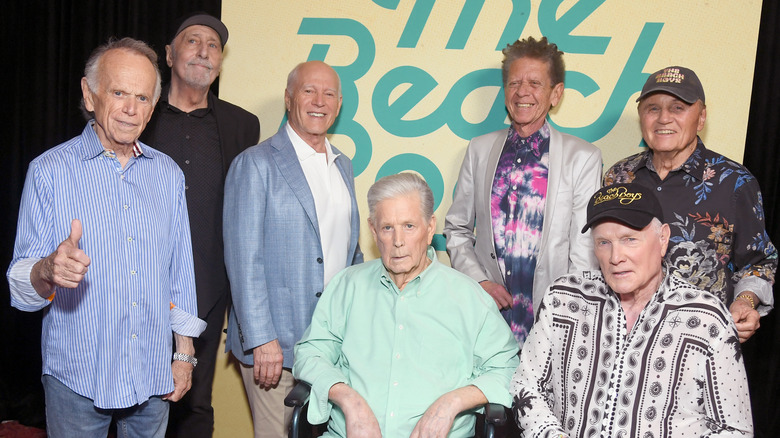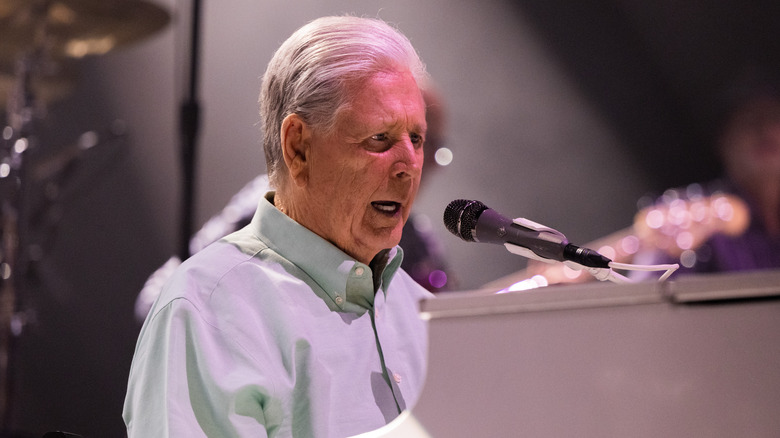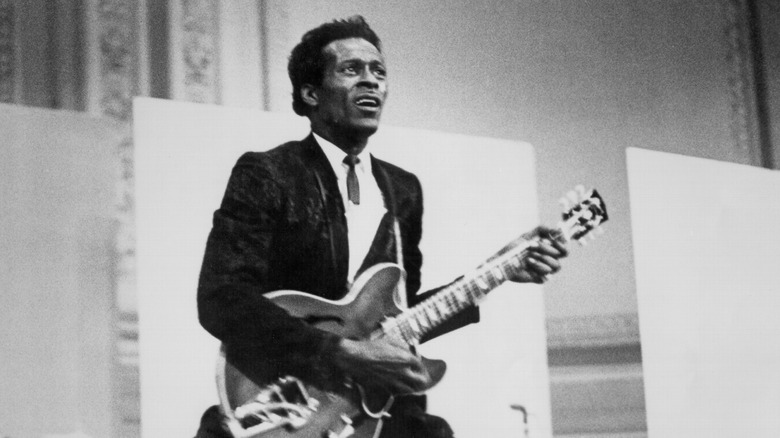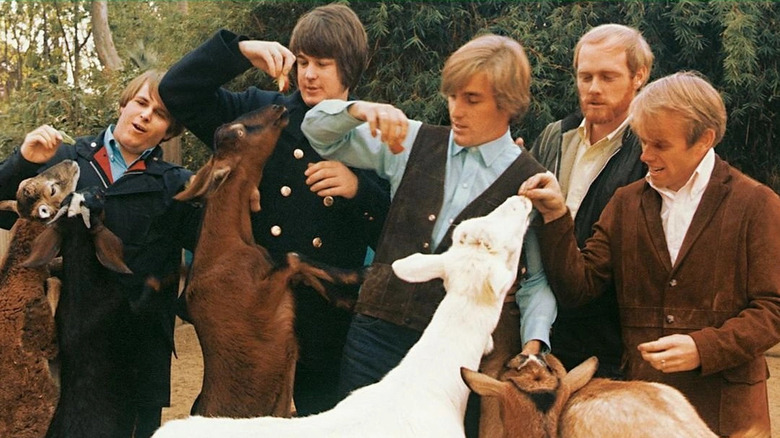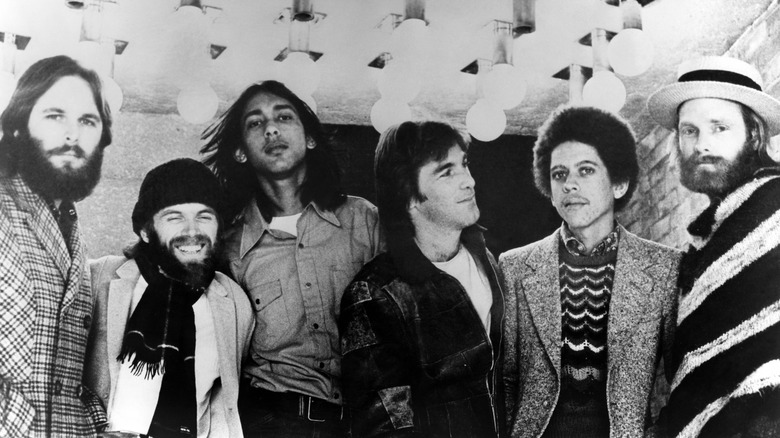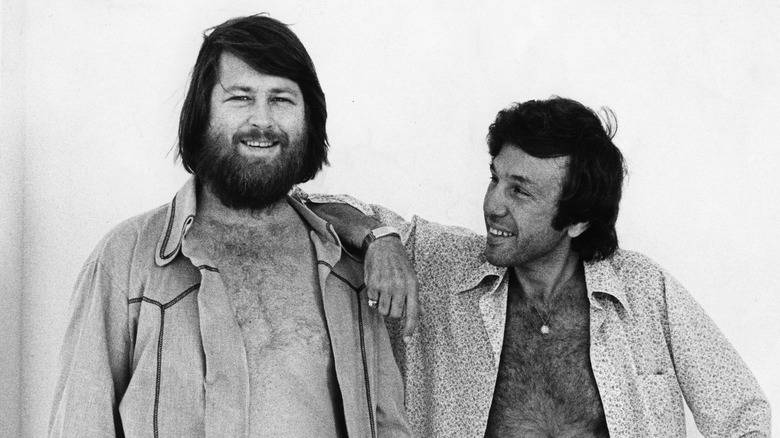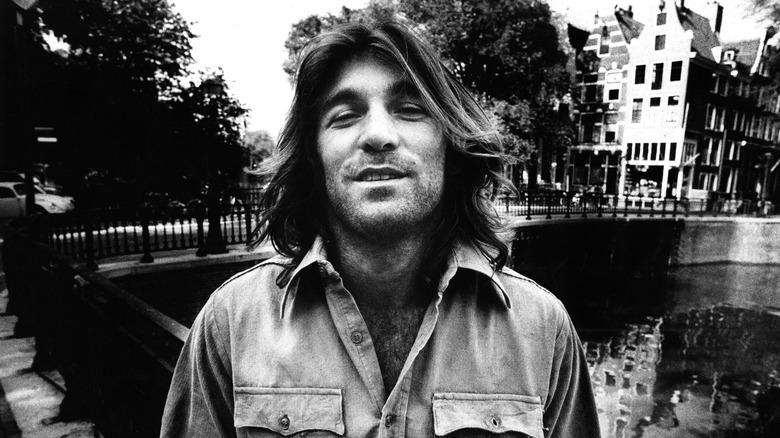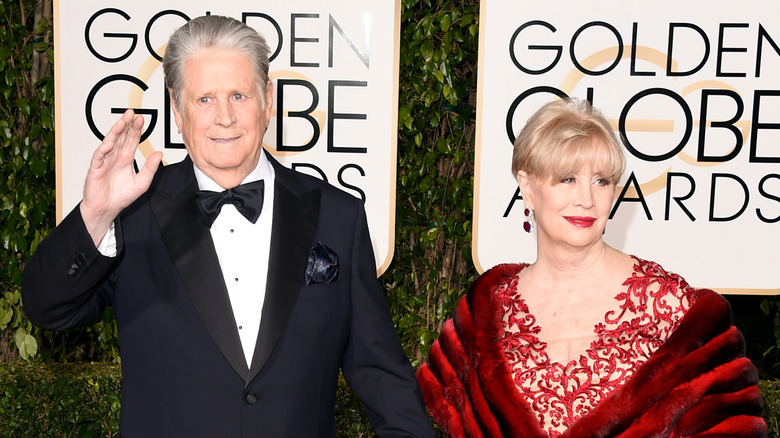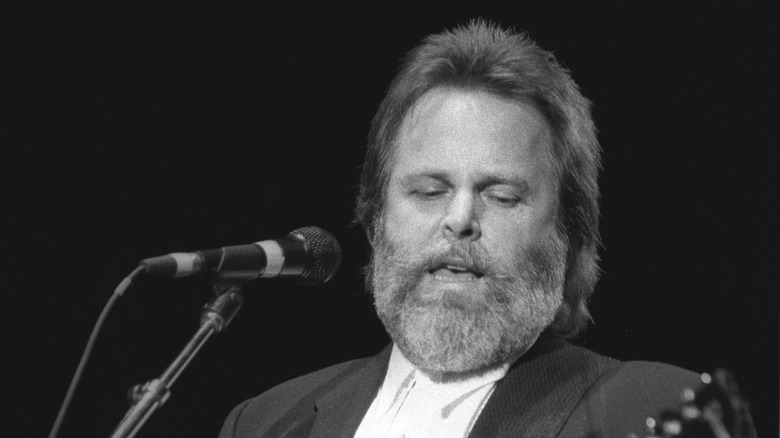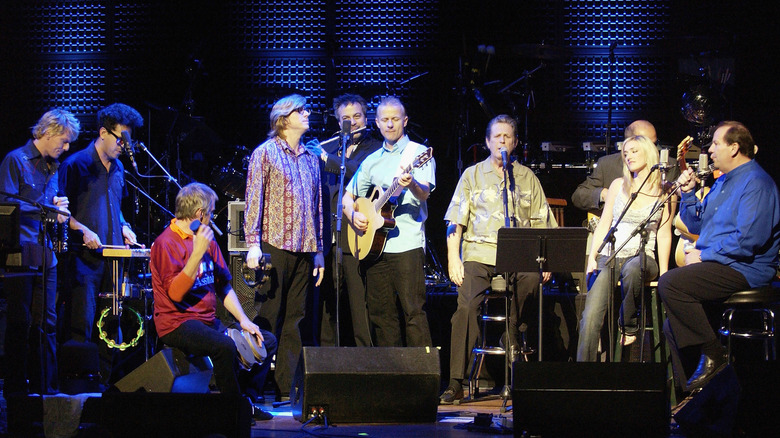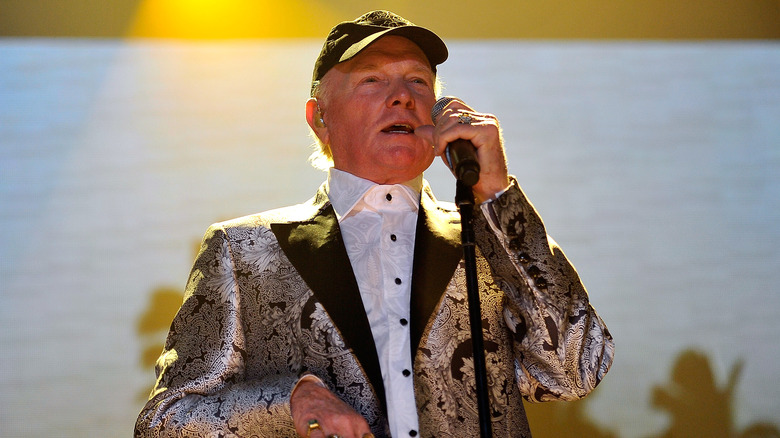Things Disney's Beach Boys Documentary Didn't Tell You About The True Story
In May 2024, music fans were graced with a brand new documentary about The Beach Boys, aptly titled "The Beach Boys," released on Disney+. Known for single-handedly providing a soundtrack to Californian surf culture, the five-member rock group – comprised of brothers Brian, Dennis, and Carl Wilson, cousin Mike Love, and friend Al Jardine – made waves as one of most chart-dominant bands of the 1960s with hit songs like "Surfin' U.S.A.," "Fun, Fun, Fun," and "California Girls." Their groovy melodies and lighthearted lyrics made them household names, but it was Brian Wilson's more emotionally wistful "Pet Sounds" that made for their most lasting contribution.
However, for all of The Beach Boys' success, their lives were also riddled with tragedy. As their careers waned against the counterculture music of the 1970s, the band's tight-knit dynamic would fray. Brian Wilson became a recluse, Dennis Wilson was consumed by alcoholism, and Mike Love became aggressively protective of the band's image — to the detriment of other members. No two-hour documentary could recount every detail of the band's rise and fall, but "The Beach Boys" certainly glances over a number of the more contentious details. The film makes it appear as though it's all water under the bridge, so the band probably won't mind if we stroll down memory lane.
Brian Wilson is deaf in one ear
If composing some of the most brilliant songs of the 20th century wasn't enough of an accomplishment, it turns out Brian Wilson did it with only one working ear. Since childhood, Wilson has been near-completely deaf in his right ear due to nerve damage, though accounts differ as to what caused it. His mother, Audree, was told by doctors that it could have been either congenital or sustained from an injury to the head. The long-held rumor was that the attack came from Brian's abusive father, Murry, wielding a lead pipe. However, in Brian's memoir, "I Am Brian Wilson," he explains that it was indeed from a lead pipe, but one wielded by a neighbor. "When I was out playing ... a kid hit me in the head with a lead pipe ... I told my mom and she took me to the doctor, who examined me and said that the eighth nerve in my head was severed."
Brian's deafness was so pronounced that he began speaking toward the left side of his face to hear himself speak and sing. This gave Brian the appearance of being, in his own words, "lopsided" while performing and giving interviews. His deafness also inspired the decision to mix music in mono instead of stereo.
Chuck Berry almost sued The Beach Boys
"The Beach Boys" contains a handful of sequences dedicated to the band's musical inspirations, including vocal group The Four Freshmen and British frenemies The Beatles. However, one is conveniently left out: Chuck Berry, the father of rock and roll. Everyone takes cues from Berry's pioneering catalog, but The Beach Boys' relationship with Berry's music hit a bit too close to home for his legal team.
Following the breakthrough success of their 1963 single, "Surfin' U.S.A.," Chuck Berry's publishing company, ARC Music, noticed that the song sounded uncannily similar to Berry's tune "Sweet Little Sixteen." This was likely because Brian Wilson himself admitted to taking direct inspiration from Berry's lyrics, opting to put a Californian spin on Berry's roll call of locations. Instead of "Boston" and "Pittsburgh, PA," he cited popular surfing spots like "Del Mar" and the "Ventura county line." The songs also contain noticeably similar chord progressions, especially when played back-to-back.
Though Wilson meant no ill will toward Berry (he even admitted to enjoying the song), ARC was adamant Wilson had engaged in plagiarism and was prepared to sue. The band's literal father figure and then-manager Murry Wilson sold them the song's copyright to appease them, making Berry a formally-credited writer on the track.
The Beach Boys were banned from the San Diego Zoo
Much of Disney's documentary is spent on the process of making "Pet Sounds," inarguably The Beach Boys' most popular album. But one surprising and hilarious piece of its history is left out, which is how its cover photo led to the band being banned from the San Diego Zoo.
Capitol Records, believing the album would be called "My Freaky Friends," set up a photo shoot at the widely popular zoo, where the band posed with several animals including goats inside a petting zoo. The band was not prepared for how jumpy they would be at the sight of food, which accounts for the awkward mix of expressions that made the final photo (pictured). Bruce Johnston, who is not pictured on the cover but was in the band at the time, claims that the goats attempted to bite him and even chewed on his radio.
However, a representative from the zoo counterclaimed that the Beach Boys themselves were the rowdy ones, engaging in pranks such as flicking a carrot on the head of a tiger, or taking baby chicks out of their cage and leaving them out in the open. Unable to handle their raucous behavior, the zoo banned The Beach Boys from ever returning, a stance they have yet to reverse since the shoot in 1966.
Ricky Fataar joined The Beach Boys after Dennis Wilson injured his hand
Ricky Fataar and Blondie Chaplin were two of the band's most unconventional additions. Previously of The Flames, the two were performing in London when Carl Wilson heard them play and later recruited them to join the group. While the documentary "The Beach Boys" makes note of this, it does skim over the finer details about how everything went down. One pivotal detail was that Fataar first joined the group as a replacement for Dennis Wilson, who had severely injured his hand the year prior and was unable to play the drums.
The Flames' association with The Beach Boys first began in 1969, when Carl offered to produce their next album under The Beach Boys' independent record label, Brother Records. The Flames' self-titled album was released the following year, while the group supported The Beach Boys on their European tour. While they would break up shortly after the album's release, Fataar was quickly brought back on stage when, in 1971, Dennis drunkenly shoved his hand through a glass door, damaging nerves and tendons. The injury would leave him off the drums for four years.
Chapman would continue to record with the Beach Boys into the early '70s and, by January of 1972, Fataar and Chaplin were inducted as permanent members of the group. However, their stints were short-lived; Chaplin would depart over creative differences in 1973, and Fataar would score another gig in 1974.
Brian Wilson's relationship with psychologist Eugene Landy was damaging
Brian Wilson's often-misunderstood mental health issues are inextricably linked to The Beach Boys' reputation, yet Disney's new documentary makes short mention of it. After experimenting with LSD in 1965, Wilson began experiencing hallucinations that, though immersive for the music, haunted his mind and led to debilitating depression, drug misuse, and other forms of dangerously erratic behavior.
In 1973, Wilson's then-wife, Marilyn Rovell, hired psychologist Eugene Landy to help Wilson get back on his feet. Landy strictly supervised Wilson's every move, keeping him on an extreme exercise regimen and controlling who he spent time with. At first, Landy's unusually aggressive treatment proved to be successful, as Wilson began losing weight and performing on stage again. However, Wilson quickly resumed spiraling and began a vicious recurring cycle of healthy behavior and hedonism.
Along with this, Landy began exerting creative control over Wilson's artistic output. He helicoptered over his work with The Beach Boys and suggested he get a cut of their profits, only to then encourage Wilson to begin a solo career during which he was often credited as a co-writer. By this point, Landy's style of care had been deemed gross negligence by medical professionals. Thankfully, he and Wilson formally parted ways in 1991 after Wilson's family found out Landy had influenced Wilson to add him into his will. This, eventually, was reversed.
Dennis Wilson died by drowning
Amidst Brian Wilson's destructive behavior, his younger brother, Dennis, was living his own life of debauchery. By 1983, Dennis had been a violent misuser of sex, drugs, and alcohol, a lifestyle that had strained his relationship with The Beach Boys and, by extension, his family. After already having been kicked out of the group once prior, his bandmates warned him that if he didn't sober up, he would no longer be allowed to tour.
Over the next month, Wilson would live an unhoused, nomadic lifestyle, crashing with friends or in local hospitals and continuing to drink. He went back and forth on whether or not to join a rehabilitation program, but he would never make it to one. On the afternoon of December 28th, 1983, Wilson's body was found dead in the waters of Marina Del Rey, after spending the day drunkenly diving for items from a previous marriage he had thrown into the water upon his divorce. It is believed that Wilson died from a shallow-water blackout, caused by hypoxia from overconsumption of alcohol.
Wilson's untimely death was The Beach Boys' first significant tragedy. However, they continued to tour shortly after his death and still do to this day.
Brian Wilson had a second wife, Melinda Ledbetter
Brian Wilson's second wife, Melinda Ledbetter, is nowhere to be found in "The Beach Boys," which is perhaps the documentary's most surprising exclusion. Many credit her with revitalizing Wilson's health and career, especially in the aftermath of Eugene Landy's abuse.
Wilson first met Ledbetter at a Cadillac dealership in 1986, where Ledbetter helped sell Wilson a car and they quickly hit it off. However, their courtship was always under Landy's watchful eye. After three years of dating — and many attempts made by Ledbetter to oust him from Wilson's life — Landy ended their relationship. But by 1991, Landy was officially out of the picture and, in 1992, after Ledbetter fatefully ran into Wilson near his recording studio, the two resumed their relationship. The couple married in 1995.
Ledbetter helped properly medicate Wilson to the point of stability, but she too, like Landy, also inserted herself into Wilson's career. Some, including Mike Love and Wilson's collaborator Joe Thomas, have claimed certain projects unraveled due to her interference. None of this affected her loving relationship with Wilson, though, which continued until her death earlier this year. In a statement posted to X (formerly known as Twitter), Wilson wrote: "Melinda was more than my wife. She was my savior."
Kokomo isn't a real place
Amidst the Beach Boys' staggering lack of success across the mid-to-late 80s, their song "Kokomo" was like an adrenaline shot. Written for the film "Cocktail" starring Tom Cruise, the single shot up to No. 1 on the Billboard charts, a milestone they hadn't reached since 24 years earlier. Employing a similar location roll-call a la "Surfin' U.S.A.," the song was infectiously catchy and made everyone eager to visit the eponymous tropical island. The only problem was that it didn't actually exist.
It's unclear where the name for the island came from, however the song originated from a demo recorded by John Phillips of the Mamas and the Papas. The original vision for the song is much more nostalgic, portraying Kokomo as an idyllic local where the narrator can escape from the doldrums of life. It can be assumed Phillips came up with Kokomo, though it's unclear if he was inspired by one of the six real cities dubbed Kokomo across the United States, including in Indiana, Missouri, and Hawaii – not exactly off the Florida Keys.
Regardless, the lack of an actual Kokomo left room for numerous businesses to take advantage of the name recognition, including a luxury private island in Fiji that folks can visit to this day.
One Beach Boys album sold less than 1000 copies
Disney's documentary asserts that "Smiley Smile" was the band's low point, but real fans know they descended far beyond that album's difficult production. Their worst reception came in 1992, with the release of "Summer in Paradise."
The first Beach Boys album to be produced without any contributions from Brian Wilson, who had already embarked on a successful solo career, the album was a critical and commercial disaster. It reportedly sold less than 1,000 copies and was the first Beach Boys album to completely miss the Billboard charts. Its reception was so poor that the album has not been included in modern reissues, has since gone out of print, and currently cannot be found on music streaming services. The only way to listen to the album is through user uploads on platforms like YouTube, where fans can be reminded of why the album is so widely reviled; its reliance on programmed keyboards and drum machines takes the band's Californian sound and makes it sound synthetic.
That said, the album did have impressive promotion. John Stamos, whose vocals are featured on the album, had a "Summer in Paradise" poster included on the set of his sitcom, "Full House." One of the album's singles, "Summer of Life," was also featured in an episode of "Baywatch."
Carl Wilson died of lung cancer
Of the core three Beach Boys brothers, Carl Wilson was the youngest, yet wound up being the glue that kept the band together even during its most tumultuous moments. As Brian and Dennis succumbed to their own vices, Carl became one of the band's signature producers and players, even releasing two of his own solo albums in 1981 and 1983. "The Beach Boys" does take a moment to highlight Carl's contributions to the group, but it doesn't talk about his particular vice: smoking.
Carl had been a heavy smoker since childhood, which eventually led to him being diagnosed with lung and brain cancer in 1997. Despite his illness, he continued to tour with the Beach Boys as he underwent chemotherapy and appeared to be thriving. However, two weeks after the death of his mother Audree in 1998, he fell ill and was admitted into a Los Angeles hospital, where he died shortly after. This leaves Brian Wilson as the only surviving Wilson brother of the original Beach Boys lineup.
Both Dennis and Carl are represented in "The Beach Boys" through archival interviews. The end of the film also features a dedication to both brothers as the remaining members of the band enjoy a reunion on the beaches of Paradise Cove.
The Beach Boys' lost album, Smile, did eventually see the light of day
One extended sequence of "The Beach Boys" focuses on the production of "SMiLE," the band's hotly-anticipated follow-up to "Pet Sounds" that would result in one of the music's most legendary pieces of lost media. Brian Wilson was determined to create his next magnum opus, but the band's increasing worries about mainstream viability, not to mention Wilson's deteriorating mental health, led to Wilson scrapping the project in 1967 and truncating it into the band's cult classic, "Smiley Smile."
Disney's documentary leaves it at that, but the album has seen the light of day in numerous different forms since then. It became one of the most commonly bootlegged albums online, although the band would also rework a few tracks into subsequent albums and release 30 minutes of material from "SMiLE" on their "Good Vibrations" box set in 1993. Then, in 2004, Wilson helped arrange a concert version of the album, dubbed "Brian Wilson Presents SMiLE," which he released as a solo album to great acclaim. However, Wilson said this version of the record is intentionally "much different" than his original vision (via Ear Candy).
Our closest reconstruction came in 2011 with "The Smile Sessions," one of many Beach Boys restorations and expansions produced by their longtime engineer, Mark Linett, and archive manager, Alan Boyd. The album was sourced from the original '60s recordings and used Wilson's 2004 solo album as a guideline. It, too, received immense praise upon release, and even won a Grammy for Best Historical Album in 2013.
Mike Love keeps a tight grip on The Beach Boys brand
Longtime fans will know that The Beach Boys have had its fair share of infighting — including the feud between band Mike Love and Brian Wilson – little of which is touched on in the documentary.
Their interpersonal struggles began during the production of "Pet Sounds," when Wilson's creative departure from their signature style put him at odds with the group and especially with Love. This led to Wilson eventually separating from the group. The death of the remaining Wilson brothers, Dennis in 1983, and Carl in 1998, left room for Love to register trademark ownership over the band and transition them into a legacy act.
This grasp on The Beach Boys' IP has led to further quarreling. When bandmate Al Jardine grew dissatisfied with Love's attempts to continue touring the band with other musicians, he began his own edition of the band entitled "The Beach Boys Family and Friends" in 2000. Love quickly took him to court, where they entered years of contentious litigation. Later, in 2012, the band's original members reunited for a tour that was so popular it extended beyond its original engagement. Wilson and Jardine were eager to continue, but Love terminated their contracts due to conflicts with his previous touring lineup, causing further contention. However, amidst all of this, the band continues to amicably appear together for anniversary celebrations, including at the end of Disney's documentary. At least for the cameras, The Beach Boys remain a family.
If you or anyone you know needs help with addiction issues or may be the victim of domestic abuse, contact the relevant resources below:
-
The Substance Abuse and Mental Health Services Administration website or contact SAMHSA's National Helpline at 1-800-662-HELP (4357).
-
The National Domestic Violence Hotline at 1−800−799−7233. You can also find more information, resources, and support at their website.
